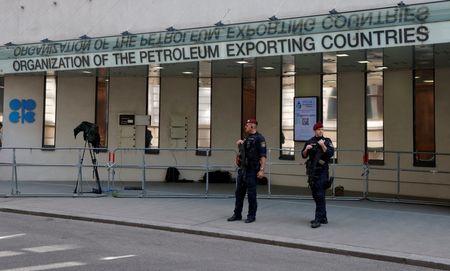By Erwin Seba
HOUSTON (Reuters) -Oil prices climbed more than 2% on Monday as further supply cuts in OPEC+ production are expected to be announced following a meeting of member countries early next week.
Brent crude futures settled up $1.71, or 2.1%, at $82.32 a barrel.
The front-month December West Texas Intermediate crude (WTI) expired at $77.60, up $1.71, or 2.3%. The more active January futures gained $2.39 to $77.83, up 1.8%.
Both benchmarks have plunged for four straight weeks, but started to rebound on Friday, settling 4% higher on profit-taking and after three OPEC+ sources told Reuters that the producer group, comprising the Organization of the Petroleum Exporting Countries and allies including Russia, is set to consider whether to make additional supply cuts when it meets on Nov. 26.
“The OPEC commentary signalling further cuts came right on cue,” said John Kilduff, partner with Again Capital LLC. “I would expect any cut would be modest. The Saudis have cut so much production, I don’t know how much more they can do.”
Goldman Sachs said that based on its statistical model of OPEC decisions, deeper cuts should not be ruled out given the fall in speculative positioning and in timespreads, and higher-than-expected inventories.
Oil prices have dropped almost 20% since late September as crude output in the U.S., the world’s top producer, held at record highs, while the market was concerned about demand growth, especially from China, the No. 1 importer of oil.
Last week, inter-month spreads for Brent and WTI slipped into contango, where prompt barrels are cheaper than those in future months, signalling ample supply.
Traders were also watching for signs of demand destruction from a possible U.S. recession in 2024 and also considering last week’s warning about possible deflation from Walmart, the largest U.S. retailer.
But most of all, traders were waiting for the OPEC+ meeting set for Sunday.
Andrew Lipow, president of Lipow Oil Associates, said members will be focused on supply and demand and not using crude as a weapon against the U.S., which is supporting Israel in its seven-week-old war against Hamas.
“Some of the countries are concerned about the war spreading to a regional conflict,” Lipow said. “They want to see their oil continue to flow.”
(Reporting by Erwin Seba in Houston; additional reporting by Paul Carsten, Florence Tan and Emily Chow, Editing by Marguerita Choy and Cynthia Osterman)



